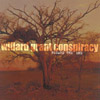Willard Grant Conspiracy, "Regard the End"
Kimchee Records
 Death is an opportunity, a chance to either lament the loss orappreciate what is being left. It is the struggle to go off in fear, indoubt or to depart with head held high. In any case, it is a subjectthat is difficult to approach head on—and probably for the best, as thetrue weight of dying lies not in the act itself but in everythingleading up to it. Regard the Endapproaches death obliquely, offering the feelings, textures, andmusings on life that make death such a spectacular event. There areslices of youthful abandon, loving memories and bitter regrets thathave rooted themselves in, and make the sting of passing even greater.It's the challenge to look back, to leave those thoughts behind,fearful yet hopeful, uncertain yet faithful, and embrace the totalityof it all. The Willard Grant Conspiracy explores these subjects with aversatile troupe of players, attacking their pieces with such a collageof instrumentation and tender arrangement, the songs bud and bloomright before your eyes. Somber acoustic guitar anchors the gruff,weathered vocals of singer Robert Fisher, the centerpiece of anensemble that offers dense, soaring trumpets and weary viola moans. Theheavy lineup grants Regard the End remarkable impact, allowingevery intonation and accent creep across and drive the emotion home.The opening song, "River in the Pines," is a civil war era ballad thatrambles on in a smoky, smoldering mass, crackling and waiting to popopen in a fiery burst. The mix of both traditional folk songs andoriginal works allows for personal expression and insight as well as amuch wider concept of the subject matter through time. A particularstrength of the Willard Grant Conspiracy, along with the utilization oftheir individual parts is the use of guest singers to help add to theatmosphere of their songs. Kristin Hersh appears on "The Ghost of theGirl in the Well," with an eerie contribution to the tale of a murderedyoung girl. She and fisher share the words and their pacing sets theentire scene in slow motion, drawing every last bit of feeling andpower from the disturbing imagery. Hersh's echoing, distant wails areaffecting as they sink into the depths of the music. Singer Jess Kleinalso contributes a set of stunning vocal performances on "The Trials ofHarrison Hayes," and several other songs. These additions strengthenthe already powerful punch in the Conspiracy's music. "The SufferingSong" is the emotional crux of Regard the End, with Fisher andKlein finding themselves on the edge and greeting the uncertainty ofwhat's beyond it with the certainty of what is there. "Suffering'sgonna come to everyone, someday." There is a restrained grace in theirvoices that makes the end of the journey feel less like a defeat andmore like a triumph. The ability to find strength and composure throughsorrow and adversity shines through and closes the album on a gloriousnote.
Death is an opportunity, a chance to either lament the loss orappreciate what is being left. It is the struggle to go off in fear, indoubt or to depart with head held high. In any case, it is a subjectthat is difficult to approach head on—and probably for the best, as thetrue weight of dying lies not in the act itself but in everythingleading up to it. Regard the Endapproaches death obliquely, offering the feelings, textures, andmusings on life that make death such a spectacular event. There areslices of youthful abandon, loving memories and bitter regrets thathave rooted themselves in, and make the sting of passing even greater.It's the challenge to look back, to leave those thoughts behind,fearful yet hopeful, uncertain yet faithful, and embrace the totalityof it all. The Willard Grant Conspiracy explores these subjects with aversatile troupe of players, attacking their pieces with such a collageof instrumentation and tender arrangement, the songs bud and bloomright before your eyes. Somber acoustic guitar anchors the gruff,weathered vocals of singer Robert Fisher, the centerpiece of anensemble that offers dense, soaring trumpets and weary viola moans. Theheavy lineup grants Regard the End remarkable impact, allowingevery intonation and accent creep across and drive the emotion home.The opening song, "River in the Pines," is a civil war era ballad thatrambles on in a smoky, smoldering mass, crackling and waiting to popopen in a fiery burst. The mix of both traditional folk songs andoriginal works allows for personal expression and insight as well as amuch wider concept of the subject matter through time. A particularstrength of the Willard Grant Conspiracy, along with the utilization oftheir individual parts is the use of guest singers to help add to theatmosphere of their songs. Kristin Hersh appears on "The Ghost of theGirl in the Well," with an eerie contribution to the tale of a murderedyoung girl. She and fisher share the words and their pacing sets theentire scene in slow motion, drawing every last bit of feeling andpower from the disturbing imagery. Hersh's echoing, distant wails areaffecting as they sink into the depths of the music. Singer Jess Kleinalso contributes a set of stunning vocal performances on "The Trials ofHarrison Hayes," and several other songs. These additions strengthenthe already powerful punch in the Conspiracy's music. "The SufferingSong" is the emotional crux of Regard the End, with Fisher andKlein finding themselves on the edge and greeting the uncertainty ofwhat's beyond it with the certainty of what is there. "Suffering'sgonna come to everyone, someday." There is a restrained grace in theirvoices that makes the end of the journey feel less like a defeat andmore like a triumph. The ability to find strength and composure throughsorrow and adversity shines through and closes the album on a gloriousnote.
 Death is an opportunity, a chance to either lament the loss orappreciate what is being left. It is the struggle to go off in fear, indoubt or to depart with head held high. In any case, it is a subjectthat is difficult to approach head on—and probably for the best, as thetrue weight of dying lies not in the act itself but in everythingleading up to it. Regard the Endapproaches death obliquely, offering the feelings, textures, andmusings on life that make death such a spectacular event. There areslices of youthful abandon, loving memories and bitter regrets thathave rooted themselves in, and make the sting of passing even greater.It's the challenge to look back, to leave those thoughts behind,fearful yet hopeful, uncertain yet faithful, and embrace the totalityof it all. The Willard Grant Conspiracy explores these subjects with aversatile troupe of players, attacking their pieces with such a collageof instrumentation and tender arrangement, the songs bud and bloomright before your eyes. Somber acoustic guitar anchors the gruff,weathered vocals of singer Robert Fisher, the centerpiece of anensemble that offers dense, soaring trumpets and weary viola moans. Theheavy lineup grants Regard the End remarkable impact, allowingevery intonation and accent creep across and drive the emotion home.The opening song, "River in the Pines," is a civil war era ballad thatrambles on in a smoky, smoldering mass, crackling and waiting to popopen in a fiery burst. The mix of both traditional folk songs andoriginal works allows for personal expression and insight as well as amuch wider concept of the subject matter through time. A particularstrength of the Willard Grant Conspiracy, along with the utilization oftheir individual parts is the use of guest singers to help add to theatmosphere of their songs. Kristin Hersh appears on "The Ghost of theGirl in the Well," with an eerie contribution to the tale of a murderedyoung girl. She and fisher share the words and their pacing sets theentire scene in slow motion, drawing every last bit of feeling andpower from the disturbing imagery. Hersh's echoing, distant wails areaffecting as they sink into the depths of the music. Singer Jess Kleinalso contributes a set of stunning vocal performances on "The Trials ofHarrison Hayes," and several other songs. These additions strengthenthe already powerful punch in the Conspiracy's music. "The SufferingSong" is the emotional crux of Regard the End, with Fisher andKlein finding themselves on the edge and greeting the uncertainty ofwhat's beyond it with the certainty of what is there. "Suffering'sgonna come to everyone, someday." There is a restrained grace in theirvoices that makes the end of the journey feel less like a defeat andmore like a triumph. The ability to find strength and composure throughsorrow and adversity shines through and closes the album on a gloriousnote.
Death is an opportunity, a chance to either lament the loss orappreciate what is being left. It is the struggle to go off in fear, indoubt or to depart with head held high. In any case, it is a subjectthat is difficult to approach head on—and probably for the best, as thetrue weight of dying lies not in the act itself but in everythingleading up to it. Regard the Endapproaches death obliquely, offering the feelings, textures, andmusings on life that make death such a spectacular event. There areslices of youthful abandon, loving memories and bitter regrets thathave rooted themselves in, and make the sting of passing even greater.It's the challenge to look back, to leave those thoughts behind,fearful yet hopeful, uncertain yet faithful, and embrace the totalityof it all. The Willard Grant Conspiracy explores these subjects with aversatile troupe of players, attacking their pieces with such a collageof instrumentation and tender arrangement, the songs bud and bloomright before your eyes. Somber acoustic guitar anchors the gruff,weathered vocals of singer Robert Fisher, the centerpiece of anensemble that offers dense, soaring trumpets and weary viola moans. Theheavy lineup grants Regard the End remarkable impact, allowingevery intonation and accent creep across and drive the emotion home.The opening song, "River in the Pines," is a civil war era ballad thatrambles on in a smoky, smoldering mass, crackling and waiting to popopen in a fiery burst. The mix of both traditional folk songs andoriginal works allows for personal expression and insight as well as amuch wider concept of the subject matter through time. A particularstrength of the Willard Grant Conspiracy, along with the utilization oftheir individual parts is the use of guest singers to help add to theatmosphere of their songs. Kristin Hersh appears on "The Ghost of theGirl in the Well," with an eerie contribution to the tale of a murderedyoung girl. She and fisher share the words and their pacing sets theentire scene in slow motion, drawing every last bit of feeling andpower from the disturbing imagery. Hersh's echoing, distant wails areaffecting as they sink into the depths of the music. Singer Jess Kleinalso contributes a set of stunning vocal performances on "The Trials ofHarrison Hayes," and several other songs. These additions strengthenthe already powerful punch in the Conspiracy's music. "The SufferingSong" is the emotional crux of Regard the End, with Fisher andKlein finding themselves on the edge and greeting the uncertainty ofwhat's beyond it with the certainty of what is there. "Suffering'sgonna come to everyone, someday." There is a restrained grace in theirvoices that makes the end of the journey feel less like a defeat andmore like a triumph. The ability to find strength and composure throughsorrow and adversity shines through and closes the album on a gloriousnote.



